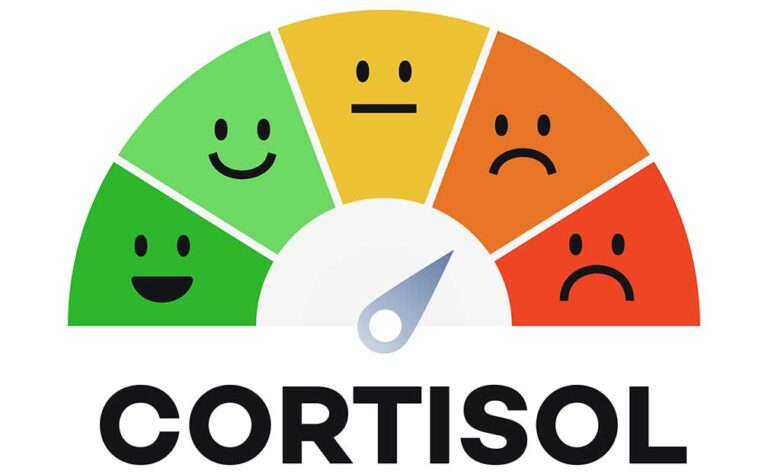Ever wonder what’s going on in your body and how it impacts your physical and mental health? If you’ve ever struggled with high levels of stress, listen up!
Cortisol, commonly known as the “stress hormone,” is vital in regulating energy, metabolism, and your body’s stress response.
For truck drivers, long hours on the road, erratic schedules and the job’s physical demands can lead to elevated cortisol levels. If unmanaged, this may result in health problems such as fatigue, weight gain, high blood pressure and even burnout.
Managing cortisol levels is essential for staying healthy and focused, especially while traveling.
Cortisol is directly linked to healthy levels of melatonin in your body. In addition, high levels of cortisol can often be confused with hormone imbalances like estrogen or testosterone.
Let’s look at natural ways to manage cortisol, including recognizing the signs, eating the right foods, choosing helpful supplements and practicing exercises and breathwork.
Signs and symptoms of high cortisol levels
High cortisol levels can manifest in various ways. Truck drivers should watch out for these symptoms:
- Difficulty falling or staying asleep.
- Constant fatigue, even after resting.
- Weight gain, especially around the abdomen
- Mood swings, anxiety, or irritability
- Increased sugar or salty cravings
- Muscle weakness or joint pain
- Brain fog or trouble concentrating
Recognizing these signs early can help you take proactive steps to manage your cortisol and improve your overall well-being.
What to eat while traveling to help balance cortisol

A balanced diet is a powerful tool for managing cortisol. While on the road, opt for foods that support your body’s ability to regulate stress, such as these cortisol-lowering options:
- Leafy greens: Spinach, kale and Swiss chard are rich in magnesium, which helps calm the nervous system.
- Nuts and seeds: Almonds, walnuts, and chia seeds are packed with healthy fats and magnesium.
- Fatty fish: Salmon and mackerel are high in omega-3 fatty acids, which reduce inflammation and stress.
- Fruit: Bananas, oranges and berries are rich in vitamin C and potassium to combat stress.
- Whole grains: Oats, brown rice and quinoa provide steady energy and support serotonin production.
On the flip side, here are some foods to avoid:
- Sugary snacks: These can cause blood sugar spikes and crashes, worsening stress levels.
- Processed foods: These contain unhealthy fats and chemicals that can elevate cortisol.
- Caffeine overload: Too much coffee or energy drinks can overstimulate cortisol production. (I know this one can be hard, aim to kick caffeine by 9:30-11:30 am)
PRO TIP FOR TRUCKERS: Prepack cortisol-balancing foods like boiled eggs, hummus and veggie sticks, trail mix (without added sugar; choose instead 70% dark cacao) and fresh fruit to avoid unhealthy truck-stop temptations.
Supplements to support cortisol management

While food is your first line of defense, supplements can provide additional support. Here are a few to consider:
- Ashwagandha: An adaptogen that helps balance cortisol levels and improve resilience to stress.
- Magnesium glycinate: Promotes relaxation and better sleep quality.
- Vitamin C: Reduces cortisol production during stress.
- Omega-3 fatty acids: Found in fish oil supplements to lower inflammation and cortisol.
- L-Theanine: Found in green tea, it promotes calmness without drowsiness.
REMEMBER: Consult your healthcare provider before starting any new supplements, especially if you’re taking medications.
Fitness for cortisol management

Getting your body moving each day is crucial for reducing stress and lowering cortisol. As a truck driver you can incorporate these exercises into your routine, even while on the road:
- Walking: A 15-minute walk during breaks can significantly lower stress levels.
- Bodyweight exercises: Planks, squats, downward dogs and lunges can be done in or right next to your truck.
- Stretching or yoga: Simple stretches or yoga poses like child’s pose, knees to chest, figure four, cobra and reclined twist help relieve tension and stress and help balance your nervous system.
Breathwork to calm the mind and body
Deep breathing exercises can activate the parasympathetic nervous system, which lowers cortisol and promotes relaxation. Here’s how to practice “box” breathing:
- Inhale for 4 seconds.
- Hold your breath for 4 seconds.
- Exhale for 4 seconds.
- Hold your breath for 4 seconds. Repeat for 5 minutes.
Lifestyle tips to maintain healthy cortisol levels
- Stick to a routine: Consistency in your eating, sleeping and driving schedules helps regulate your body’s internal clock.
- Get morning sunlight: Exposure to sunlight early in the day supports a healthy circadian rhythm.
- Stay hydrated: Dehydration can increase cortisol levels, so keep a water bottle handy.
- Prioritize sleep: Aim for consistent sleep the best you can. Consider a noise machine, sleep mask, weighted blanket or aromatherapy to help with sleep regulation.
Driving a truck can leave your daily routine NOT so routine, so step back and consider what you can do each day that you have control over. Then, when you get on the road you can aim to stay consistent.
Keep health in your front-facing view
Managing cortisol levels naturally is essential for everyone, especially as we age.
Eating the right foods, incorporating regular exercise and breathwork, and using targeted supplements can keep stress at bay and stay healthy, focused and energized.
Remember, small, consistent changes can make a big difference in your well-being. You’ve got this!
For more health, fitness and lifestyle tips from Hope Zvara, click here.
Hope Zvara is a regular contributor to The Trucker, providing tips for healthy living on the road as well as tips to control stress. She is also the CEO of Mother Trucker Yoga and Road Relief Wellness. She has been featured in Forbes and Yahoo News, and is a regular guest on SiriusXM Radio. Her practical strategies show drivers how they can go from unhealthy and out of options to feeling good again.







